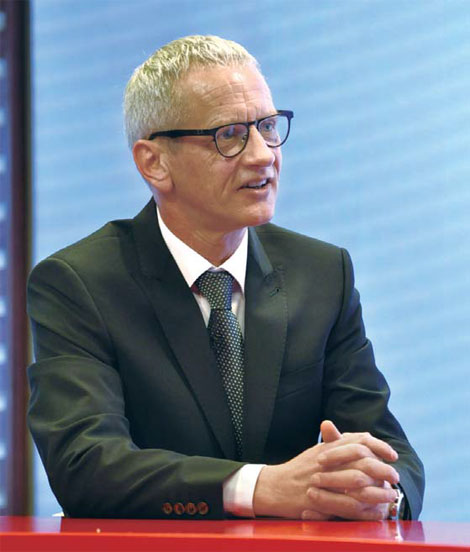BMW finance chief aims to accelerate business
Hopes to overtake rivals within three years with 50 percent market penetration
Uwe Stadtler is man with a driving ambition. The CEO of BMW Automotive Finance (China) Co has a "personal target" to see the company finance one out of every two BMW cars in China within three years.
As a joint venture between BMW AG and BMW Brilliance Automotive Ltd, BMW AFC was established in 2010 and has been going in top gear since then. It has increased paid-in capital to 4.8 billion yuan ($762 million; 675 million euros), in 2015 it serviced over 136,000 new retail finance contracts and has more than 400 employees.
|
Uwe Stadtler, CEO of BMW Automotive Finance (China) Co, says the biggest challenge in China is to keep a balance between flexibility and stability. Provided to China Daily |
Despite a slowdown in vehicle sales, the automotive finance sector still saw double-digit growth last year.
The auto finance market exceeded 700 billion yuan in 2014, with annual compound growth rate reaching 33.6 percent during 2012-14, statistics from the auto financial institution under the China Banking Regulatory Commission shows.
In China, the overall penetration rate of auto finance stood at 20 percent in 2014, much lower than that of developed markets such as the US (80 percent) and developing countries like India (70 percent), according to the institution.
As auto finance products become increasingly acceptable with customers in the 18 to 35 age bracket, BMW sees huge growth potential in the auto finance business.
According to Li Wei, assistant president of the auto finance platform of Yixin Capital, China's penetration rate of auto finance will reach 50 percent by 2020 and the scale of this market will hit 1.5 trillion yuan ($0.23 trillion; 0.21 trillion euros).
In fact, with Internet companies like Baidu, Alibaba and Tencent joining the auto finance market, the competitive landscape has become more revved up.
"Competition is not scary. Instead, it brings opportunities and motivation," says Stadtler. "We've been improving our technology capabilities to make it easier and faster to meet our customer demand."
For instance, the company has invested deeply to boost the speed of assessing and approving loan applications.
"Around 95 percent of applications were processed within one hour last year, and this year we plan to have 50 percent processed within seconds," says Stadtler. Internet-based automotive finance companies usually take 15 minutes to finish assessing and approval.
"Compared with BAT, our competitive edge is that we know the customers and our cars better. We are committed to offer customer-tailored products," says Stadtler.
In order to meet the wide-ranging demands of different customer segments, the company offers a diversified portfolio of flexible financial products.
Young families, for instance, may prefer lower monthly installments while those who can afford more might use finance products to upgrade to models such as the flagship BMW 7 series.
The biggest challenge in China, Stadtler says, is to keep a balance between flexibility and stability.
Though he does not disclose the exact ratio of the company's non-performing loans, he says it is below the industry average. And China, he adds, sees one of the lowest NPL ratios in the auto finance sector in the Asia-Pacific region.
Due to the license number restrictions in many cities, financial leasing has been touted as the next growth sector in China's automobile market and BMW Group has recently acquired Herald Leasing Co, Ltd.
"New business drivers, such as leasing and fleet management are becoming increasingly important. The acquisition will complement our local financing by adding leasing options," says Stadtler.

























